The vibrant tapestry of Varanasi’s musical arts and culture reflects the soul of this spiritual heart of India. From the sitar and tabla to the mesmerizing Ganga Aarti, music serves as a vital expression of devotion, connecting individuals to the divine. Immersing oneself in this captivating landscape unveils the profound impact of sound on spiritual experiences, while exploring the rich tradition of Hindu art and the renowned Baba School of Music. As travelers uncover the intricate interplay of music, arts, and culture, they’ll gain a deeper appreciation for the artistic legacy and cultural identity that define this extraordinary region.
Good To Know
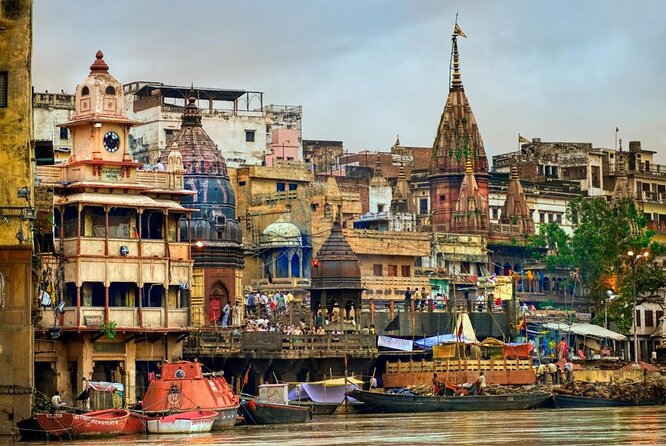
- Varanasi, the spiritual epicenter of India, offers a rich tapestry of culture, art, and music that captivates visitors from around the world.
- Hindu art serves as a conduit for connecting with the divine, encompassing forms like painting, sculpture, dance, and Indian classical music.
- Baba the School of Music provides hands-on experiences with diverse musical instruments, enhancing appreciation for India’s rich musical heritage.
- The Ganga Aarti, a nightly devotional music ritual on the banks of the Ganges River, showcases the profound influence of music in Hindu culture.
- Private transportation and accessibility options ensure a comfortable experience for visitors exploring the music, arts, and culture of Varanasi.
Varanasi: Spiritual Heart of India
Varanasi, India’s spiritual epicenter, is a city steeped in mythological significance and divine energy. Founded by Lord Shiva, this vibrant hub intertwines culture, art, and music, creating a tapestry of traditions and spirituality.
As the artistic and spiritual heart of the country, Varanasi inspires centuries of artistic expression and cultural practices. Hindu culture views art as a form of devotion and expression, with Indian classical music, rooted in the Samaveda, regarded as a divine art form capable of uplifting the soul and connecting with the divine.
Varanasi’s rich heritage and artistic legacy continue to captivate visitors from around the world.
You can also read our reviews of more tours and experiences in Varanasi.
Hindu Art: Devotion and Expression
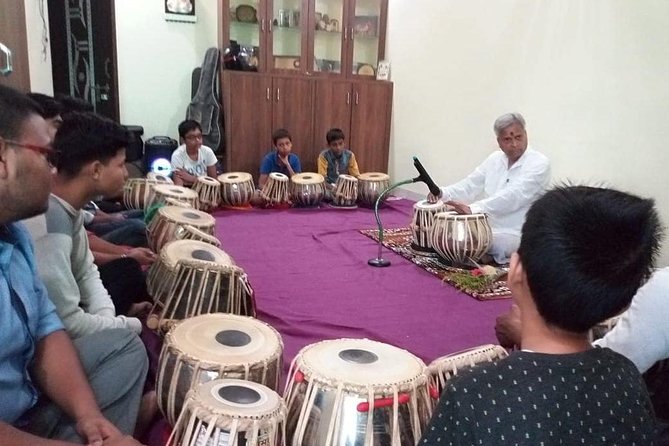
In Hindu culture, art is revered as a form of devotion and expression, serving as a conduit for connecting with the divine. Indian classical music, rooted in the Samaveda, is regarded as a sacred art form capable of uplifting the soul.
Through intricate melodies, rhythms, and improvisations, musicians channel divine energy, eliciting spiritual transcendence. Art in Hinduism extends beyond music, encompassing painting, sculpture, and dance, all of which are imbued with religious symbolism and spiritual significance.
Whether it’s the intricate carvings of a temple or the graceful movements of a Bharatanatyam dancer, Hindu art is a testament to the deep-rooted connection between the divine and human expression.
Baba the School of Music
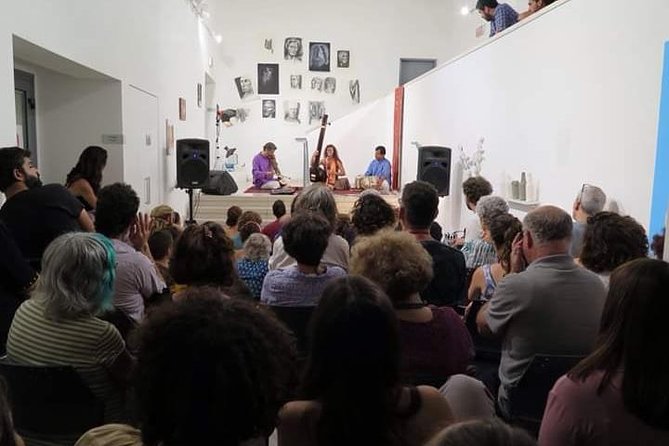
Visitors to Baba the School of Music can explore a diverse array of musical instruments and learn about their cultural significance. Through hands-on experiences, guests can try playing a variety of instruments, gaining a deeper appreciation for the rich musical heritage of India. The school’s expert instructors guide visitors, offering insights into the unique tones and histories of each instrument.
| Instrument | Description | History |
|---|---|---|
| Sitar | A plucked stringed instrument | Originated in the 13th century |
| Tabla | A pair of hand drums | Developed in the 18th century |
| Sarod | A fretless stringed instrument | Evolved from the Afghan rubāb |
| Veena | A lute-like plucked instrument | One of the oldest Indian instruments |
| Bansuri | A bamboo flute | Closely associated with Lord Krishna |
Exploring Musical Instruments
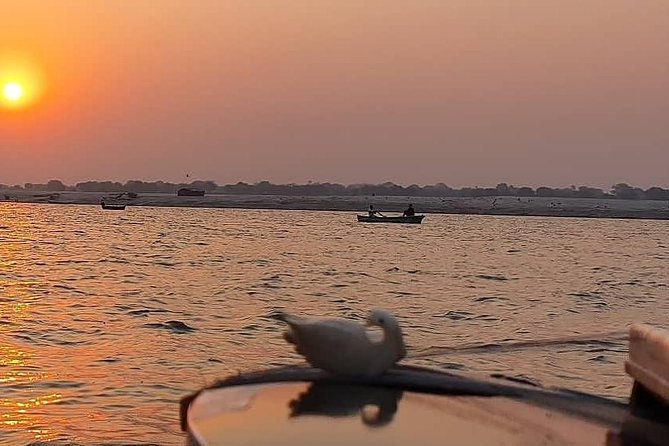
Instruments like the sitar, tabla, and bansuri serve as captivating gateways into India’s rich musical heritage.
At Baba the School of Music, visitors can explore and learn about these iconic instruments:
-
The sitar, with its distinctive gourd-shaped resonating chamber and intricate fretwork, is a staple of North Indian classical music.
-
The tabla, a pair of hand drums, provides the rhythmic foundation for many Indian musical performances.
-
The bansuri, a melodic bamboo flute, is closely associated with the divine figure of Krishna and the devotional music of the Varanasi region.
-
Beyond these well-known instruments, the school also showcases a variety of other traditional Indian instruments, each with its own unique sound and cultural significance.
Ganga Aarti: Devotional Music
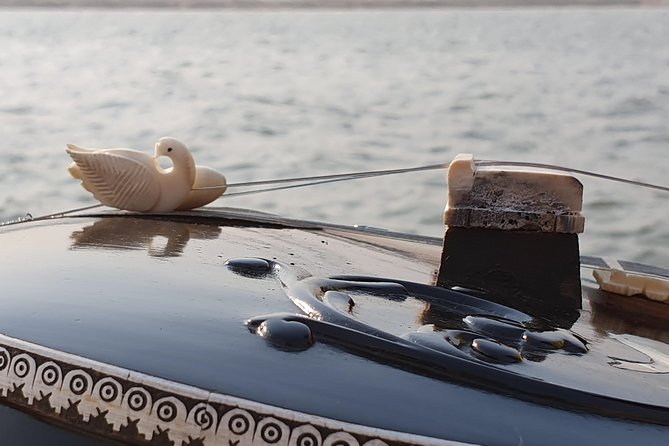
One of the most captivating experiences in Varanasi is the Ganga Aarti, a nightly ritual that immerses visitors in the rich tapestry of devotional music and religious tradition.
As the sun sets over the sacred Ganges River, devotees and musicians gather on the riverbanks to participate in this awe-inspiring spectacle. The air is filled with the mesmerizing sounds of kirtan and bhajana, ancient musical forms that evoke a deep spiritual connection.
Waves of harmonious chanting and the rhythmic beat of traditional instruments create a transcendent atmosphere, transporting participants to a realm of divine devotion.
The Ganga Aarti is a truly immersive experience, showcasing the profound influence of music in Hindu culture.
Music and Culture in Varanasi
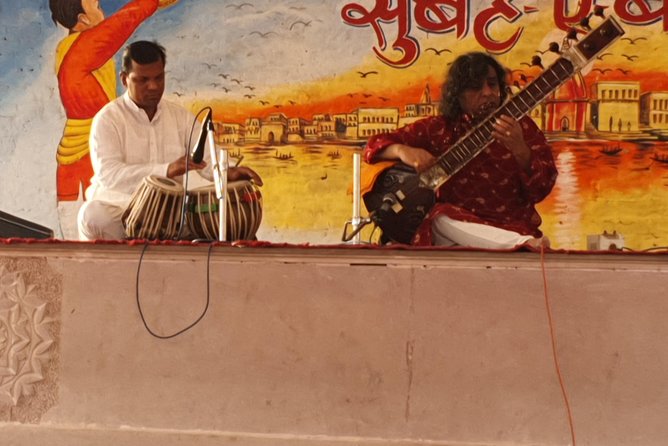
How does music and culture intertwine in the captivating city of Varanasi?
Steeped in mythological significance and divine energy, Varanasi is the spiritual and artistic heart of India. The city’s rich heritage inspires centuries of artistic expression and cultural practices.
Visitors can enjoy this vibrant tapestry of traditions:
- Explore the Baba the School of Music, learning about various instruments and trying their hand at playing.
- Experience the enchanting Ganga Aarti, a religious and devotional music ceremony on the banks of the sacred Ganges River.
- Discover the deep-rooted connection between Indian classical music and Hindu spirituality, as the divine art form uplifts the soul.
- Engage with the city’s passionate artisans, musicians, and cultural custodians, forging a profound understanding of Varanasi’s enduring legacy.
Private Transportation and Accessibility
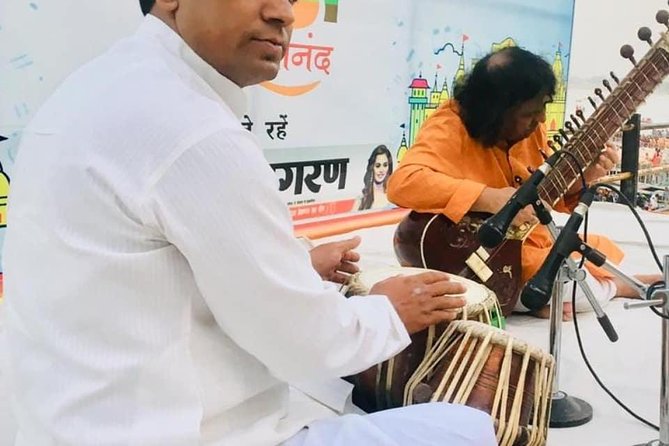
Private transportation is included in the Varanasi music and culture tour, providing visitors with flexible pickup options to suit their needs.
The tour accommodates a range of accessibility requirements, though it isn’t specifically designed for wheelchair users. Service animals are welcome, and infant seats are available for families.
This level of flexibility ensures a seamless and comfortable experience for all participants. While the tour may not be fully accessible, the organizers strive to make it as inclusive as possible, catering to the diverse needs of travelers who wish to enjoy Varanasi’s rich musical and cultural heritage.
Traveler Reviews and Feedback
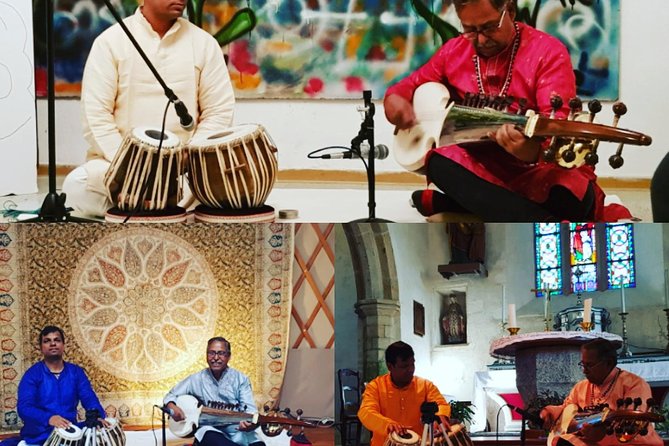
What do travelers have to say about the Varanasi music and culture tour? Based on a 5.0 rating from 3 reviews, the feedback is overwhelmingly positive.
Reviewers highlight the enriching experience at Baba the School of Music, praising the introduction to Indian music and the opportunity for hands-on learning.
Travelers commend Ravi and his team for their professionalism, friendliness, and effective teaching methods, which contributed to a deeper understanding of classical Indian music.
The tour’s key strengths include:
- Engaging and knowledgeable instructors
- Immersive exploration of Indian musical instruments
- Opportunity to participate in the Ganga Aarti ceremony
- Overall culture and appreciation for Hindu art forms
Frequently Asked Questions
What Are the Best Times of the Year to Visit Varanasi?
The best times to visit Varanasi are during the festivals of Diwali in October-November and Holi in March, when the city comes alive with vibrant celebrations and spiritual rituals. The weather is also pleasant during these peak seasons.
How Can I Learn About the History and Significance of the Ganges River?
The Ganges River holds immense historical and spiritual significance in Hindu culture. Visitors can learn about its storied past and sacred role through guided tours, cultural experiences, and discussions with local experts.
Are There Any Other Cultural Performances or Festivals in Varanasi?
Varanasi hosts several vibrant cultural festivals throughout the year, including the annual Ganga Mahotsav, a celebration of the Ganges River featuring music, dance, and spiritual rituals. Visitors can also experience the captivating Ganga Aarti ceremony along the river’s ghats.
What Are the Best Places to Shop for Traditional Varanasi Handicrafts?
The best places to shop for traditional Varanasi handicrafts are the city’s lively bazaars, such as Chowk Market and Thatheri Bazaar. Visitors can find exquisite silk sarees, brocade fabrics, delicate woodcarvings, and intricate brass and copper articles.
Are There Any Local Cuisine or Dining Experiences I Should Try in Varanasi?
Visitors to Varanasi shouldn’t miss trying the city’s renowned local cuisine, like spicy Banarasi chaat and the famous Benarasi paan. For a truly immersive dining experience, try an evening boat cruise along the Ganges River.
Sum Up
Varanasi’s vibrant cultural landscape intertwines music, arts, and spirituality, offering visitors a profound connection to India’s rich heritage. From the mesmerizing Ganga Aarti to the mastery of traditional instruments, this holy city showcases the enduring power of artistic expression as a means of devotion and cultural identity. Exploring Varanasi’s artistic offerings provides a truly immersive and transformative experience that captures the essence of India’s timeless traditions.
More Tour Reviews in Varanasi
Not for you? Here's more things to do in Varanasi we have recnetly reviewed
- 20 Best 2 Day Tours In Varanasi
- 20 Best 3 Day Tours In Varanasi
- 25 Best Cruises And Boat Tours In Varanasi
- 6 Best Food Tours In Varanasi
- 15 Best Full-Day Tours In Varanasi
- 2 Best 4 Day Tours In Varanasi
- 7 Best Photography Experiences In Varanasi
- 8 Best Dining Experiences In Varanasi
- 8 Best Dinner Tours In Varanasi
- Varanasi: Ganga Arti Evening Light Ceremony on the Main Ghat
- Learn to Play a Traditional Indian Instrument in Varanasi!
- Day Trip of Haridwar and Rishikesh From Delhi By Car
